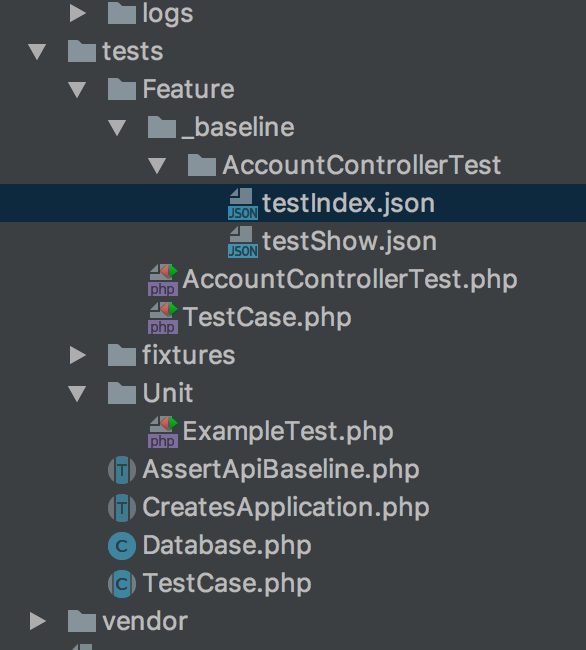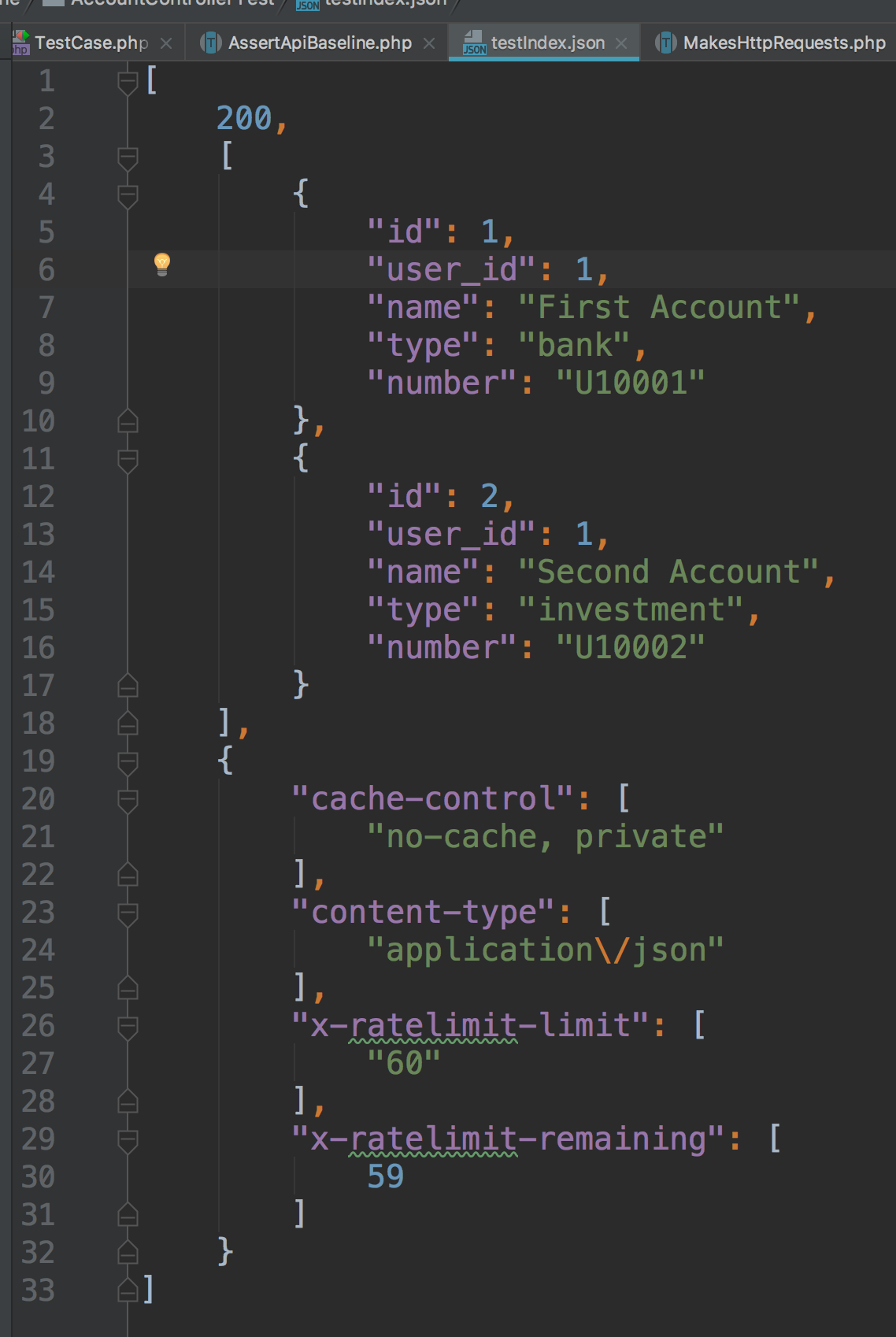本文主要探討寫laravel integration/functional test cases時候,如何assert。前面幾篇文章主要聊瞭如何reseed測試資料,mock資料,本篇主要聊下assert的可行實踐,儘管laravel官方文件聊了Testing JSON APIs,並提供了一些輔助的assert方法,如assertStatus(), assertJson()等等,但可行不實用,不建議這麼做。
最佳需要是對api產生的response做更精細的assert。那如何是更精細的assertion?簡單一句就是把response code/headers/content 完整內容進行比對(assert)。 方法就是把response的內容存入json檔案裡作為baseline。OK,接下來聊下如何做。
寫一個AccountControllerTest,call的是/api/v1/accounts,AccountController的內容參照寫Laravel測試程式碼(三),然後寫上integration/functional test cases:
<?php
declare(strict_types=1);
namespace Tests\Feature;
use Tests\AssertApiBaseline;
final class AccountControllerTest extends TestCase
{
use AssertApiBaseline;
protected const ROUTE_NAME = 'accounts';
public function testIndex()
{
$this->assertApiIndex();
}
public function testShow()
{
$this->assertApiShow(1);
}
}
很明顯,這裡測試的是index/show api,即/api/v1/accounts和/api/v1/accounts/{account_id},AssertApiBaseline是一個自定義的trait,主要功能就是實現了assert 全部response,並儲存在json檔案裡作為baseline。所以,重點就是AssertApiBaseline該如何寫,這裡就直接貼程式碼:
<?php
declare(strict_types=1);
namespace Tests;
use Carbon\Carbon;
use Illuminate\Contracts\Support\Arrayable;
use Illuminate\Foundation\Testing\TestResponse;
trait AssertApiBaseline
{
private static $middlewareGroup = 'web';
private static $cookies = [
'web' => [
'D' => 'DiJeb7IQHo8FOFkXulieyA',
],
'api' => [
],
];
private static $servers = [
'web' => [
'HTTP_ACCEPT' => 'application/json',
'HTTP_ORIGIN' => 'https://test.company.com',
'HTTP_REFERER' => 'https://test.company.com',
],
'api' => [
'HTTP_ACCEPT' => 'application/json',
],
];
public static function assertJsonResponse(TestResponse $response, string $message = '', array $ignores = []): TestResponse
{
static::assertJsonResponseCode($response, $message);
static::assertJsonResponseContent($response, $message);
static::assertJsonResponseHeaders($response, $message);
return $response;
}
public static function assertJsonResponseCode(TestResponse $response, string $message = ''): void
{
static::assert($response->getStatusCode(), $message);
}
public static function assertJsonResponseContent(TestResponse $response, string $message = '', array $ignores = []): void
{
static::assert($response->json(), $message);
}
public static function assertJsonResponseHeaders(TestResponse $response, string $message = ''): void
{
$headers = $response->headers->all();
$headers = array_except($headers, [
'date',
'set-cookie',
]); // except useless headers
static::assert($headers, $message);
}
public static function assert($actual, string $message = '', float $delta = 0.0, int $maxDepth = 10, bool $canonicalize = false, bool $ignoreCase = false): void
{
// assert $actual with $expected which is from baseline json file
// if there is no baseline json file, put $actual data into baseline file (or -d rebase)
// baseline file path
// support multiple assertion in a test case
static $assert_counters = [];
static $baselines = [];
$class = get_called_class();
$function = static::getFunctionName(); // 'testIndex'
$signature = "$class::$function";
if (!isset($assert_counters[$signature])) {
$assert_counters[$signature] = 0;
} else {
$assert_counters[$signature]++;
}
$test_id = $assert_counters[$signature];
$baseline_path = static::getBaselinesPath($class, $function);
if (!array_key_exists($signature, $baselines)) {
if (file_exists($baseline_path) && array_search('rebase', $_SERVER['argv'], true) === false) { // '-d rebase'
$baselines[$signature] = \GuzzleHttp\json_decode(file_get_contents($baseline_path), true);
} else {
$baselines[$signature] = [];
}
}
$actual = static::prepareActual($actual);
if (array_key_exists($test_id, $baselines[$signature])) {
static::assertEquals($baselines[$signature][$test_id], $actual, $message, $delta, $maxDepth, $canonicalize, $ignoreCase);
} else {
$baselines[$signature][$test_id] = $actual;
file_put_contents($baseline_path, \GuzzleHttp\json_encode($baselines[$signature], JSON_PRETTY_PRINT));
static::assertTrue(true);
echo 'R';
}
}
/**
* @param string|string[]|null $route_parameters
* @param array $parameters
*
* @return mixed
*/
protected function assertApiIndex($route_parameters = null, array $parameters = [])
{
return static::assertApiCall('index', $route_parameters ? (array) $route_parameters : null, $parameters);
}
protected function assertApiShow($route_parameters, array $parameters = [])
{
assert($route_parameters !== null, '$route_parameters cannot be null');
return static::assertApiCall('show', (array) $route_parameters, $parameters);
}
protected static function getFunctionName(): string
{
$stacks = debug_backtrace(DEBUG_BACKTRACE_IGNORE_ARGS);
do {
$stack = array_pop($stacks);
} while ($stack && substr($stack['function'], 0, 4) !== 'test');
return $stack['function']; // 'testList'
}
protected static function getBaselinesPath(string $class, string $function): string
{
$class = explode('\\', $class);
$dir = implode('/', array_merge(
[strtolower($class[0])],
array_slice($class, 1, -1),
['_baseline', array_pop($class)]
));
if (!file_exists($dir)) {
mkdir($dir, 0755, true);
}
return base_path() . DIRECTORY_SEPARATOR . $dir . DIRECTORY_SEPARATOR . $function . '.json';
}
protected static function prepareActual($actual)
{
if ($actual instanceof Arrayable) {
$actual = $actual->toArray();
}
if (is_array($actual)) {
array_walk_recursive($actual, function (&$value, $key): void {
if ($value instanceof Arrayable) {
$value = $value->toArray();
} elseif ($value instanceof Carbon) {
$value = 'Carbon:' . $value->toIso8601String();
} elseif (in_array($key, ['created_at', 'updated_at', 'deleted_at'], true)) {
$value = Carbon::now()->format(DATE_RFC3339);
}
});
}
return $actual;
}
private function assertApiCall(string $route_action, array $route_parameters = null, array $parameters = [])
{
[$uri, $method] = static::resolveRouteUrlAndMethod(static::resolveRouteName($route_action), $route_parameters);
/** @var \Illuminate\Foundation\Testing\TestResponse $response */
$response = $this->call($method, $uri, $parameters, $this->getCookies(), [], $this->getServers(), null);
return static::assertJsonResponse($response, '');
}
private static function resolveRouteName(string $route_action): string
{
return static::ROUTE_NAME . '.' . $route_action;
}
private static function resolveRouteUrlAndMethod(string $route_name, array $route_parameters = null)
{
$route = \Route::getRoutes()->getByName($route_name);
assert($route, "Route [$route_name] must be existed.");
return [route($route_name, $route_parameters), $route->methods()[0]];
}
private function getCookies(array $overrides = []): array
{
$cookies = $overrides + self::$cookies[static::$middlewareGroup];
return $cookies;
}
private function getServers(array $overrides = []): array
{
return $overrides + self::$servers[static::$middlewareGroup];
}
}
雖然AssertApiBaseline有點長,但重點只有assert()方法,該方法實現了:
- 如果初始沒有baseline檔案,就把response內容存入json檔案
- 如果有json檔案,就拿baseline作為expected data,來和本次api產生的response內容即actual data做assertion
- 如果有'rebase'指令表示本次api產生的response作為新的baseline存入json檔案中
- 支援一個test case裡執行多次assert()方法
所以,當執行phpunit指令後會生成對應的baseline檔案:


OK,首次執行的時候重新生成baseline檔案,檢視是不是想要的結果,以後每次改動該api後,如果手滑寫錯了api,如response content是空,這時候執行測試時會把baseline作為expected data和錯誤actual data 進行assert就報錯,很容易知道程式碼寫錯了;如果git diff知道最新的response 就是想要的(如也無需求需要把'name'換另一個),就phpunit -d rebase 把新的response作為新的baseline就行。。
這比laravel文件中說明的寫json api test cases的優點在哪?就是對response做了精細控制。對response 的status code,headers,尤其是response content做了精細控制(content的每一個欄位都行了assert對比)。
這是我們這邊寫api test cases的實踐,有疑問可留言交流。
本作品採用《CC 協議》,轉載必須註明作者和本文連結